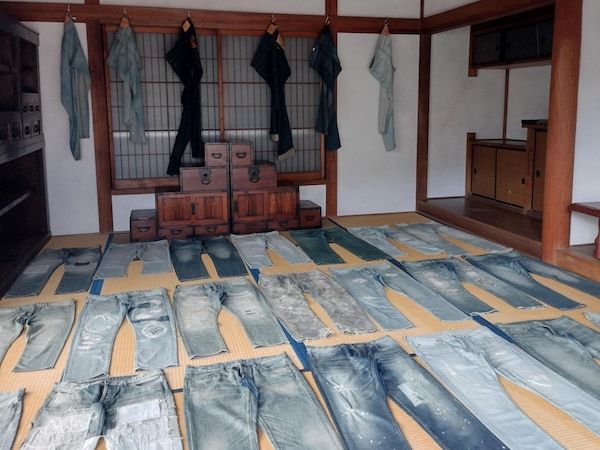Kojima Jeans Street: A Japan Vintage Denim Paradise for Enthusiasts
Nestled in the southwestern seaside of Okayama Prefecture, Kojima has established itself as a veritable paradise for denim enthusiasts. This quaint locale draws fans from around the globe, eager to experience its rich history and craftsmanship in the world of high-quality jeans. According to the Japan National Tourism Organization, approximately 100,000 visitors flock to this area each year, making it a significant destination for denim aficionados.
As you arrive at the Kojima train station, the first thing that catches your eye are the soda vending machines, adorned with vibrant images of jeans. The roads themselves echo the area’s denim pride, painted in blue with pink and white lines that mimic the seams of Kojima jeans. This charming aesthetic sets the stage for the unique experience that awaits.
Kojima boasts around 40 jeans manufacturers and stores, including denim-themed cafes that showcase the fabric’s versatility. Renowned for their durability and high-end quality, Japanese jeans have carved out a niche in the global market despite being a small part of it. The reputation for craftsmanship is unparalleled, with Kojima serving as the birthplace for popular brands like Big John, which has roots dating back to the 1940s. Today, these manufacturers supply denim to prestigious international fashion labels, including Gucci.
Emma McClendon, an assistant professor of fashion studies at St. John's University in New York, highlights the distinctive approach of the Japanese denim industry. Unlike mass marketing strategies, Kojima’s artisans focus on connoisseurship and the meticulous art of collecting. This dedication reflects a broader Japanese ethos of 'monozukuri,' or 'making things,' emphasizing laborious attention to detail and pride in craftsmanship.
Visitors to Jeans Street might find themselves surprised by the area’s unpretentious charm. Unlike the glitz of major fashion centers, Kojima is relatively uncrowded, with each local company being small in scale, typically employing about 100 individuals. The spirit of craftsmanship is palpable, as artisans pour their hearts into every piece they create.
One such artisan is Yoshiharu Okamoto, a dyeing craftsman at Momotaro Jeans, who describes the denim-making process as akin to producing a kimono. His hands and nails are stained blue from the labor-intensive process of dyeing threads of Zimbabwean cotton. Okamoto takes immense pride in his work, knowing the right state of the indigo by smell and feel—a task he undertakes every single day. "It’s not that easy to get this special color," he explained during a recent tour of the production facilities. "It’s my life."
The deep indigo hue characteristic of Kojima's denim has become synonymous with Japanese craftsmanship, earning it the moniker "Japan blue," or "tokuno blue," meaning "especially concentrated blue." The price of these meticulously crafted jeans varies widely, starting from around 33,000 yen ($230) for more accessible options and climbing to over 200,000 yen ($1,400) for pieces made by top artisans.
According to Thomas Stege Bojer, founder of Denimhunters, a dedicated online platform for denim enthusiasts, Japanese brands excel in using "raw denim" that ages beautifully and is designed to last. This commitment to quality ensures that each pair of jeans crafted in Kojima tells a story, woven into the very fabric of Japan’s rich cultural heritage.
As Kojima continues to attract denim lovers from all walks of life, its legacy as a hub of craftsmanship and creativity is destined to endure, reminding the world of the timeless allure of high-quality jeans.

